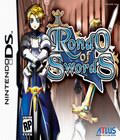Genre: Turn-Based Strategy
Publisher: Atlus
Developer: Success
Release Date: April 15, 2008
Role-playing games have made the DS one of their favorite haunts. The eclectic collection of titles ranging from Pokémon to Digimon and Final Fantasy to Dragon Quest creates a library large enough to rival those of its larger, next-gen cousins.
One publisher in particular, Atlus, has built up a reputation for bringing over PS2 titles that don't quite fit in the typical JRPG mold, whether they involve high school students fighting the forces of darkness in Persona 3 or a walking car in Steambot Chronicles. With Atlus' newest import, Rondo of Swords, DS players get another strategy RPG filled with villains and heroes wrapped in a gameplay system that dares to try something different. While it tries to shed the tried-and-true trappings set in place by classics such as Sega's Shining Force series and Square Enix's Final Fantasy Tactics, it also comes up short in a few ways that make managing this army as much of a challenge as it is in facing the enemy.
Taking place on the continent of Bravord, Rondo begins with the peaceful kingdom of Bretwald being ruthlessly attacked by the Grand Meir Empire during the funeral of its king. The lands are thrown into chaos. After narrowly escaping the enemy, Prince Serdic and his friends find themselves driven from the capital, but not without allies. The player needs to take command of this group to fight their way back to Bretwald, free the kingdom, and discover the reason behind the Grand Meir Empire's lust for war.
The story is told through still portraits of the main characters at the start of almost every mission, and when certain members find themselves next to each other on the battlefield. Many of the characters and situations resemble clichés that veteran players have often seen in other RPGs, so while it's not the most engaging story, it services the gameplay in keeping things interesting and moves the action along from one battle to the next. The voice acting is restricted to battlefield chatter when you attack or fall in combat, but not much more than that. The chibi characters add a certain charm to the colorful visuals, although the plain portraits of each character do little more than indicate who is speaking.
Rondo comes with a set of 10 lessons to get the player accustomed to the gameplay system; each one slowly involves the player in the required mechanics, and the difficulty level of each lesson increases as you move toward the last battle, which incorporates everything that you've learned. The top screen is usually used for displaying character statistics, while the bottom screen features a top-down map and indicates where you're leading your armies. Unfortunately, the learning curve is rather steep, and much of the instruction consists of being told what you can do and then throwing you into the fire ? where you'll discover how easy it is to die from just one mistake. Not only do the lessons introduce you to what you need to know, but they also serve as a taste of the unforgiving gameplay.
Movement is handled via a grid system, and each character has a range of how far he can go on the overhead map, depending on the terrain. As you move the cursor from your selected character with either the stylus or the d-pad, you'll draw a path that the character will follow, which is important to remember for when it comes to attacking your enemy. This is where Rondo stands out from the rest of the pack.
Attacking your foes requires you to simply draw a path through them, and your character will charge through each one and do damage, if possible. Any surviving enemies will show their statistics via health bars above their heads. In a way, Rondo comes off as a form of fantasy chess, where you move your pieces through the enemy while planning for a second attack if your first one doesn't do the job. This also means that you only have one move for whatever you want to achieve.
Archers can attack enemies after moving, and while this makes them extremely valuable, it doesn't make sense that other ranged units suffer from the "one move" penalty. This also means that if you accidentally move a character to the wrong spot, you won't be able to redo it, unlike some SRPGs that allow a little leeway. It certainly adds a sense of challenge to the title, but it also feels as if the gameplay has to be crippled in order to provide it.
Fortunately, there are a few tricks that you can use to even the odds and make Rondo a little less intimidating. Characters can build up their Overbreak gauge as they successfully attack enemies, and once the gauge is full, they can unleash a special ability against foes. These attacks can take the form of a lance of searing light ripping through enemy ranks, healing for everyone, or a focused strike on a single target for incredible damage. There are also special abilities that characters can learn by using skill points earned from leveling up. Passing a character through his party members can also bestow benefits depending on which active skills are equipped, such as healing a few of their wounds or improving their critical strike percentage. Other abilities help improve the characters' combat skills, allowing them to expand their spell-casting library with new tricks or improve their ZOC, or "Zone of Control."
A character armed with ZOC becomes the equivalent of a wall of insurmountable strength, so when enemies try and pass through them, they're stopped in their tracks. Units don't stack, which means that if multiple enemies try to pass through a character with ZOC, they'll start filling in squares around them, which can work to your advantage. Some damage is taken when this occurs, and you can expect the same thing to happen to you if the roles were reversed. ZOC isn't a guarantee of success in bottling up the enemy, however, as there are some abilities that can allow a character to pass through that guard like a battle-ax through rice paper.
Even with levels and skills, Rondo can even be a difficult slog for experienced SRPG players. The first stage alone, where players take on the role of Prince Serdic and his friends in their flight from the capital of Bretwald, can easily end in overwhelming disaster, and that's only the first battle. The next few battles tend to seesaw in their difficulty; some are cakewalks, while others are brutal tests of attrition. Other characters will also show up and can be recruited; this adds to the number of characters that you can field at the outset of each fight, but you may have to put in some work to rescue a few that need your help. Failing to do so will simply leave you without them, but as the game proceeds, having many different characters in your party can go a long way in making the war a little easier to win.
Battles take place across a wide variety of stages, and whether it's a castle or a forest with a dirt road, the enemy AI is competent enough to know how to use the terrain, single-minded though it may be in its approach. If a battle isn't going your way, you can always restart it with all of the experience that you have earned, used items returned to your inventory, and all characters back at full strength. This tactic can also be useful for players who are eager to upgrade weaker characters without risking complete defeat. Players can also save, quit and continue later if they need to turn in their general's cap for the night.
Eventually, you'll be able to perform tasks during the break between each battle; you can assign characters to errands for equipment, quests for experience and items, learn new skills, and change classes, as long as each has the requisite level and items. You can also set up who you want in your party for the next battle; you can establish the desired formation, but during the skirmish, you can select who's going to be doing the actual fighting. Performing errands, quests, and training, however, will remove characters from your party for the next battle. Players who remember adventuring through Disgaea's side-dungeons captured within its weapons and items won't find the same joy here, since most of what happens occurs behind the scenes. It also doesn't make a whole lot of sense to remove character from use in the next battle because they simply went shopping. Does it really take that long to find a few items before the next battle? There's also no guarantee that they will find anything useful, either, which can be bad if you could have used them in the previous fight, if only to level them up.
Rondo offers a branching storyline depending on how certain battles play out, but it also lacks several features that could've made it easier for newcomers and veterans alike to get used to its mechanics. The brutal difficulty can easily become a frustrating experience when one wrong move can doom your party. It can become a chore to click on enemy foes to figure out what you might be dealing with, such as whether or not they have ZOC. You also have to peek at the edge of the screen to check a character's range and estimate how far you can really go. Skill selection also shares the "one move" mentality of the gameplay, as all choices are final; if you make a mistake in selecting which skill you wanted a character to learn, that's just too bad.
Ultimately, Rondo of Sword's ruthless difficulty may frustrate newcomers lured in by the packaging artwork or the Atlus name, while veterans may feel as if they're fighting with an army of soldiers that have one arm tied behind their backs. There are genuine moments when victory tastes that much sweeter because you overcame incredible odds and eked out a narrow victory. With a unique combat system, colorful graphics, and character upgrade options that deliver plenty of challenges, Rondo of Swords might not be the kind of war that everyone may want to fight, but it won't hold back those who decide to take up the struggle.
Score: 6.7/10
More articles about Rondo of Swords











 Rondo of Swords is a fantasy strategy RPG that combines an epic narrative, complete with a branching story and multiple endings, with an innovative combat mechanic that takes advantage of the DS touch screen and forces you to add even more strategy and planning to your attacks.
Rondo of Swords is a fantasy strategy RPG that combines an epic narrative, complete with a branching story and multiple endings, with an innovative combat mechanic that takes advantage of the DS touch screen and forces you to add even more strategy and planning to your attacks.

















































